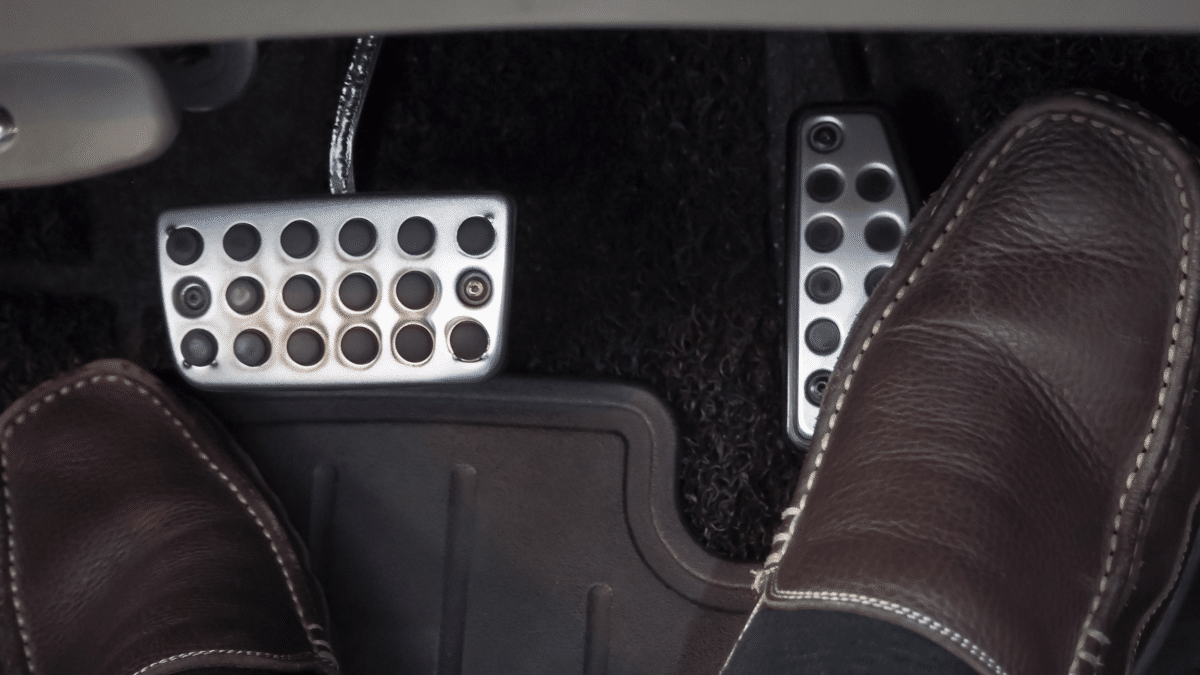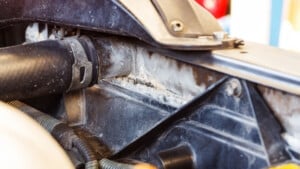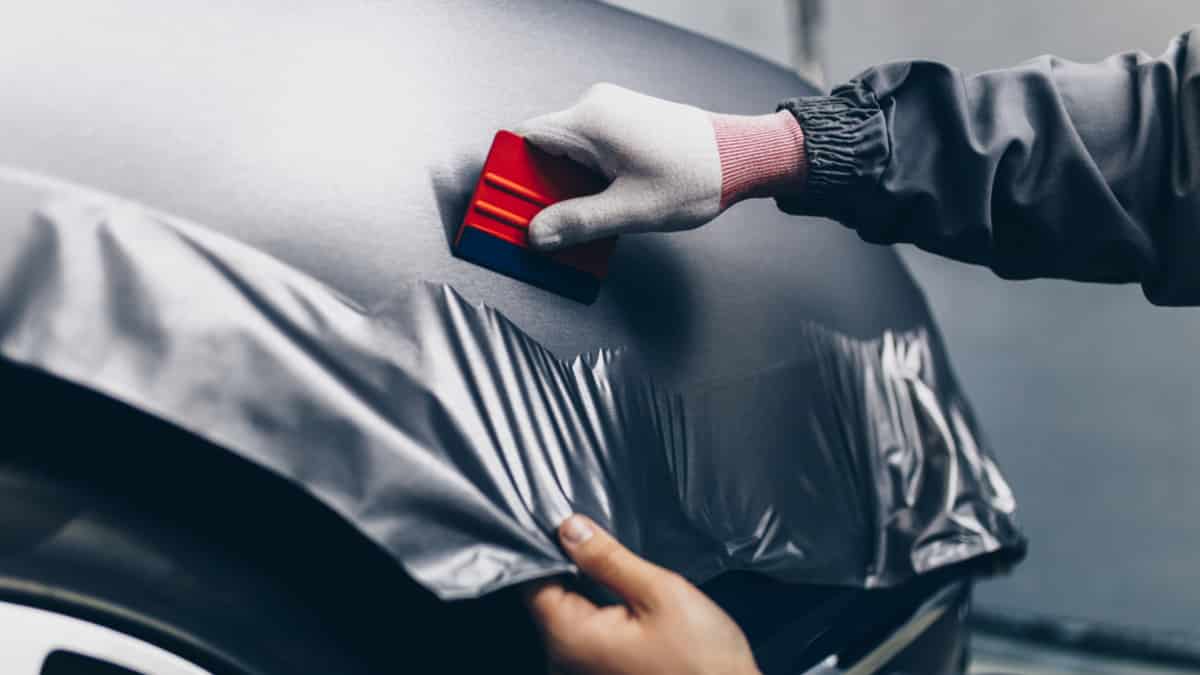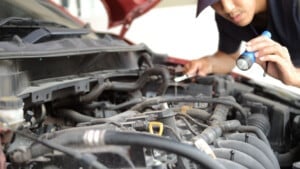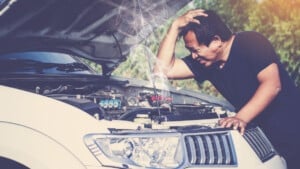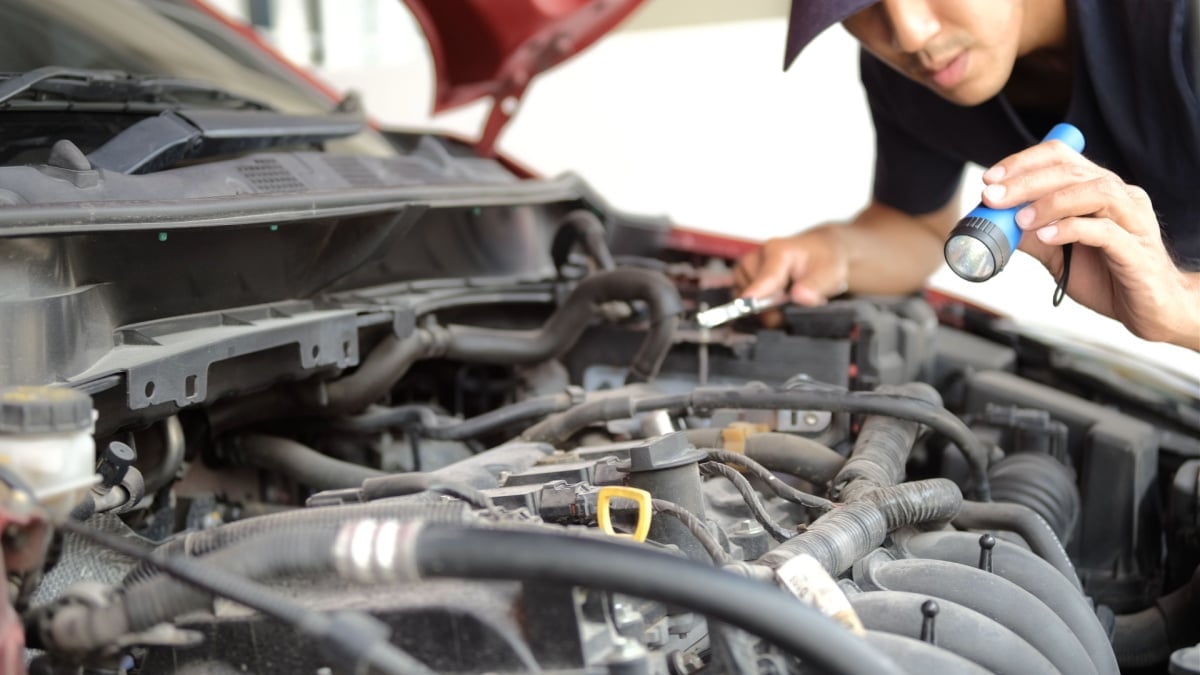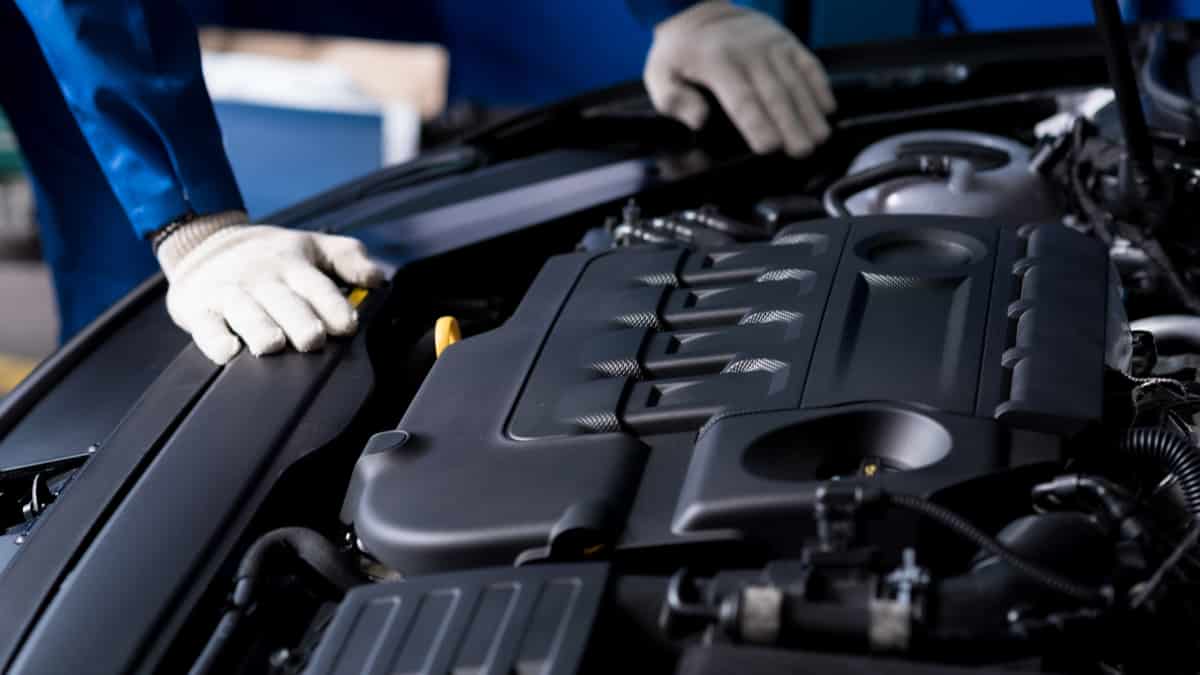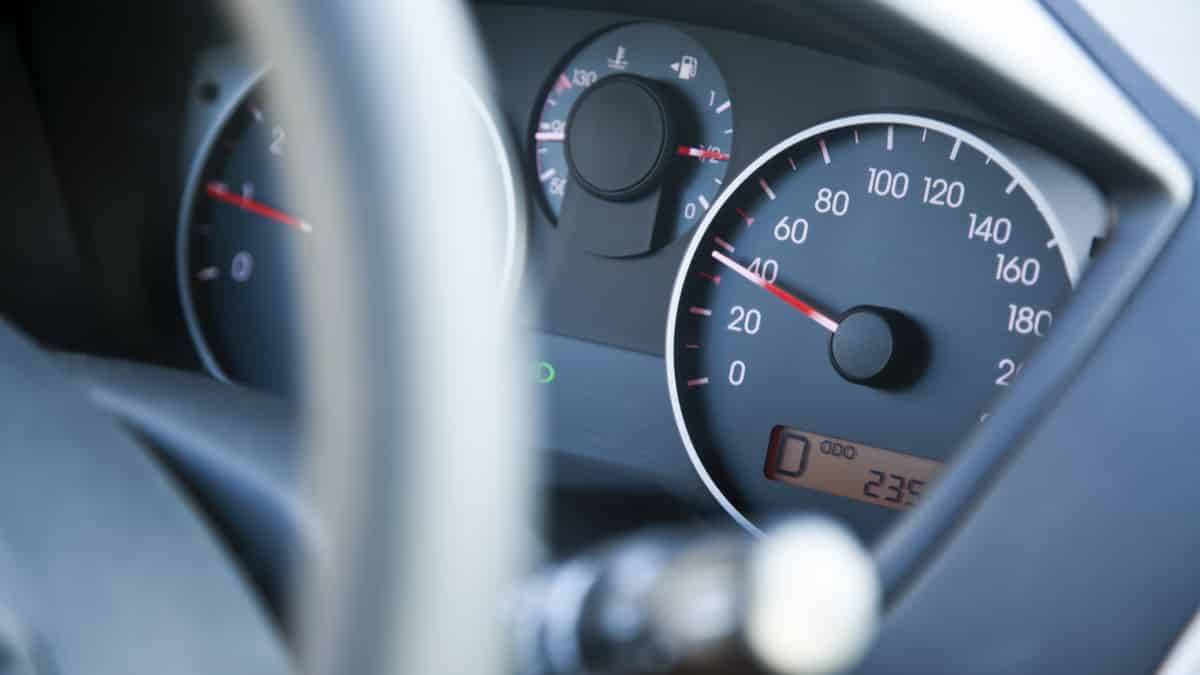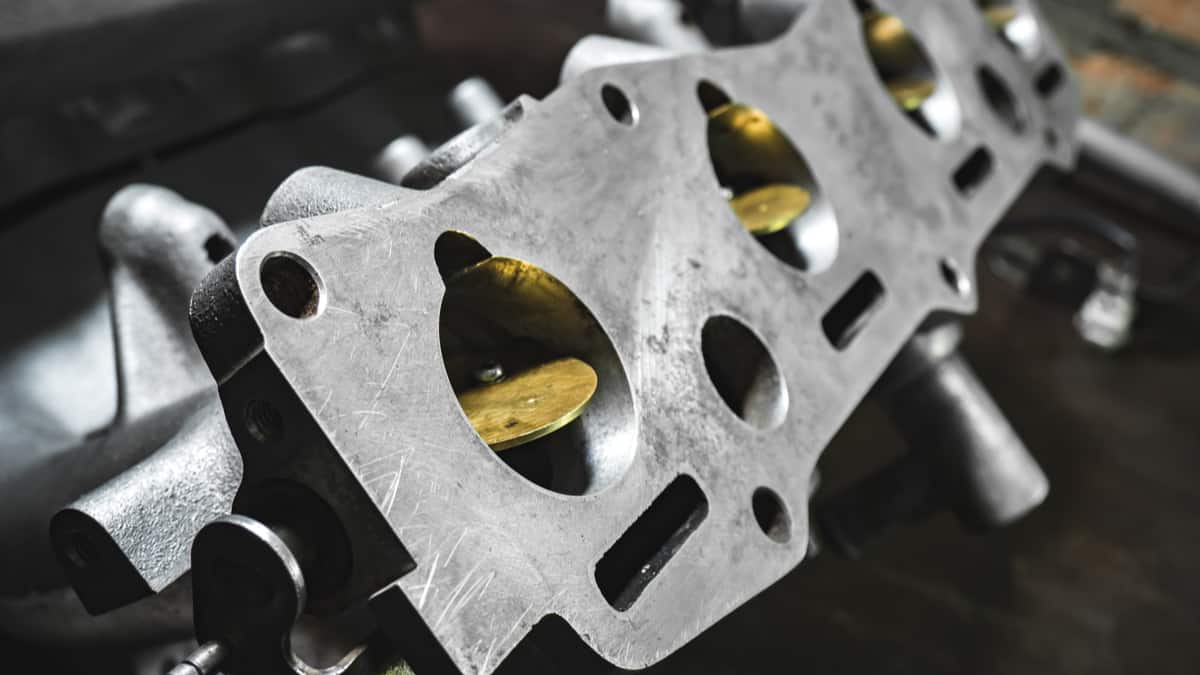It’s never a good thing to hear a rattling sound coming from your car. If the car rattles when accelerating, it’s usually a sign that something is wrong. Whether it’s a loose part or a failing mechanical component, you want to get it fixed before things get worse.
In this guide, we cover the reasons for the rattling, especially during acceleration. We also look at how to fix the rattle and answer your most important questions.
Reasons Why A Car Rattles When Accelerating
If you hear a rattle while accelerating, it may be caused by a loose or damaged exhaust heat shield, a bad catalytic converter or other loose exhaust parts. It can also be caused by low oil, low oil pressure, failing motor mounts, a faulty belt tensioner or idler pulley, damaged engine parts or a worn suspension.
Let’s look at these closer.
1. Damaged Or Loose Exhaust Heat Shield
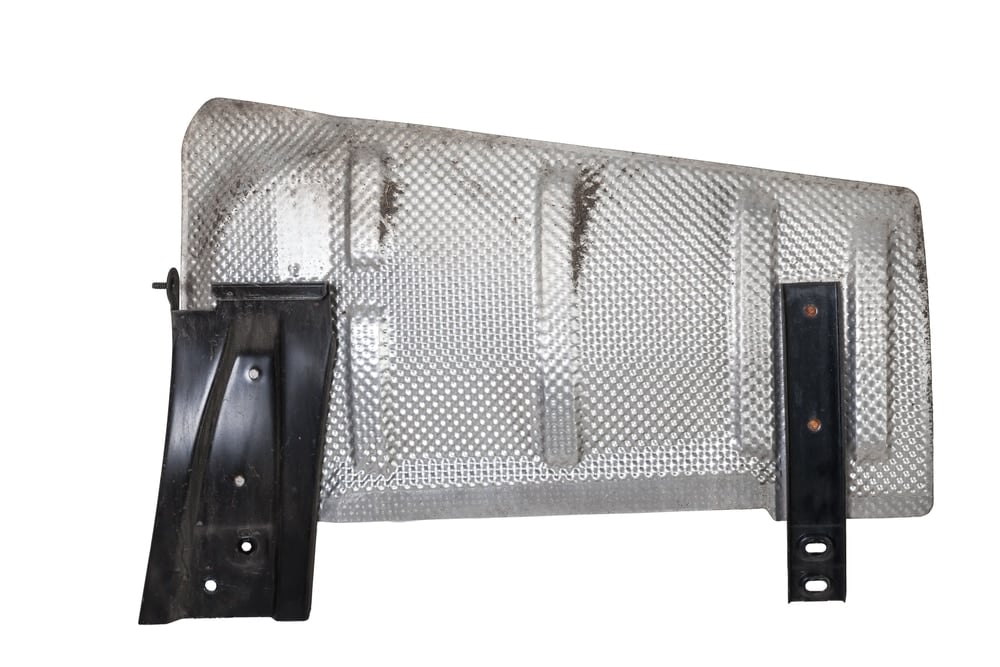
The exhaust heat shield covers the components that get hot, such as the exhaust pipes, catalytic converter, exhaust manifold and muffler. It gets bolted or riveted directly to the exhaust so it can absorb some of the heat coming from the engine.
However, the shield can break free over time from vibration and wear. As it gets damaged, it becomes loose and starts to rattle.
You’ll also find heat shields bolted to the vehicle’s chassis, which can come loose and come into contact with the exhaust system, causing a rattling sound.
2. Damaged Catalytic Converter
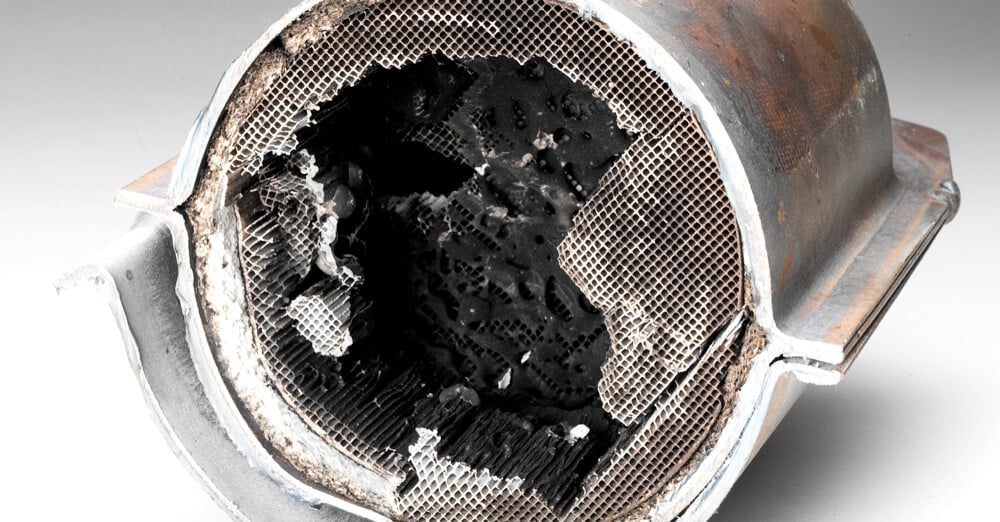
The catalytic converter is responsible for turning exhaust gases into something better suited to the environment. Because there are catalysts inside the converter, clogs can occur and exhaust gases can start to become trapped.
When this happens, the engine has to work harder, creating some performance issues. It can also lead to a rattling sound, especially during acceleration.
3. Other Loose Exhaust Parts
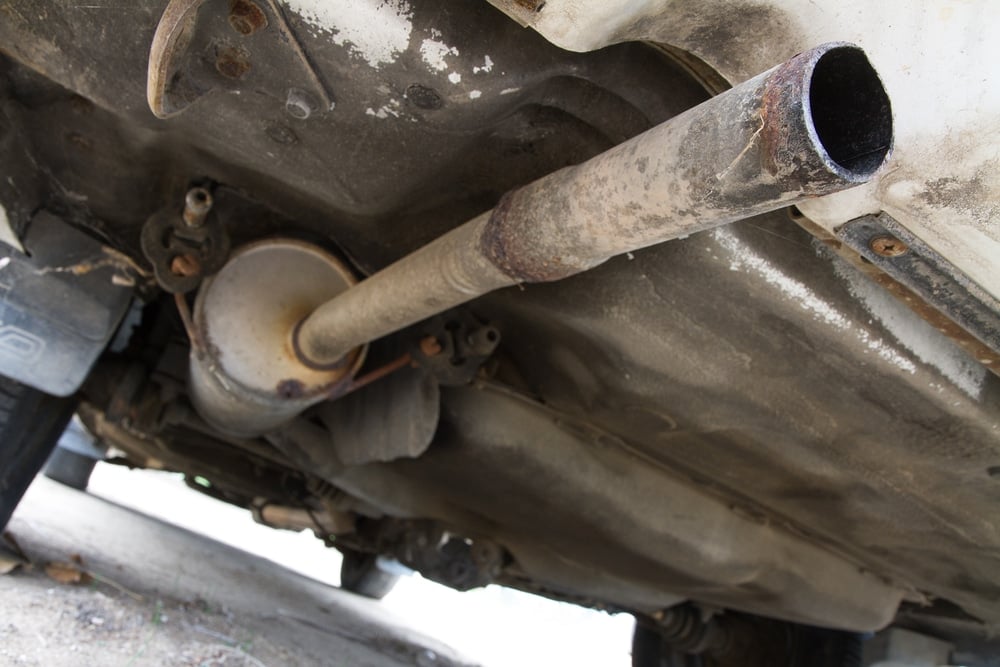
A car’s exhaust system contains multiple parts, all of which can break loose over time and rattle. These parts should be bolted to one another, but it’s not impossible for them to break free.
Rattling occurs when the resonator pipe, muffler or flex pipe starts to shake around. However, don’t overlook the possibility that a bracket or clamp has broken too.
4. Low Oil Level
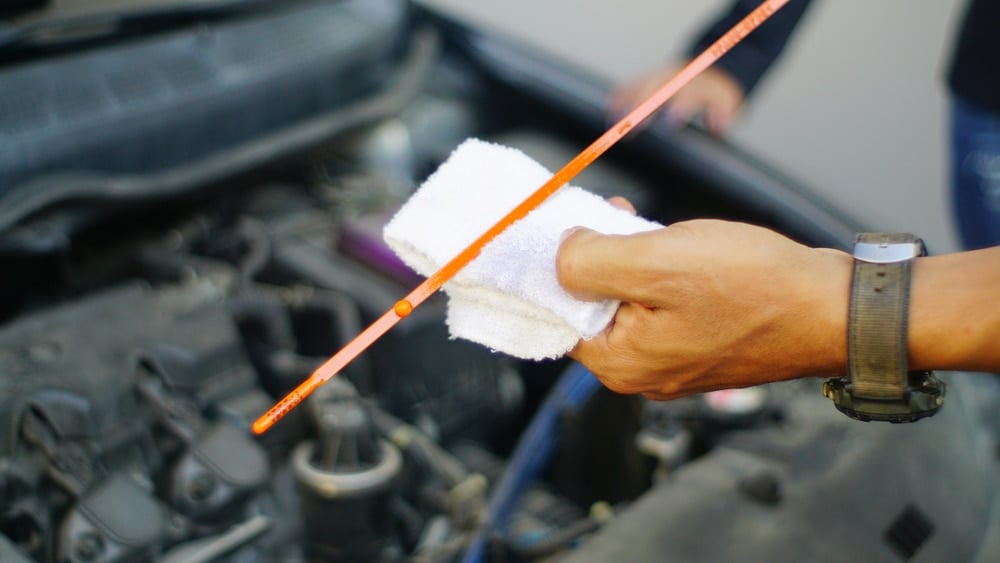
The engine needs a specific amount of oil to keep proper lubrication in the motor. With this lubrication, the metal parts won’t rub together.
However, when the oil drops too low, you may start to hear a rattling sound. It can get significantly worse while accelerating.
5. Low Oil Pressure
If oil pressure drops, a rattling sound can also occur. In this case, the rattle often comes from the crankshaft bearings.
If there’s not a good amount of oil pressure, engine damage can occur. However, you have to figure out what caused the pressure drop, whether it is a failing oil pump or a clogged filter.
6. Failing Motor Mounts
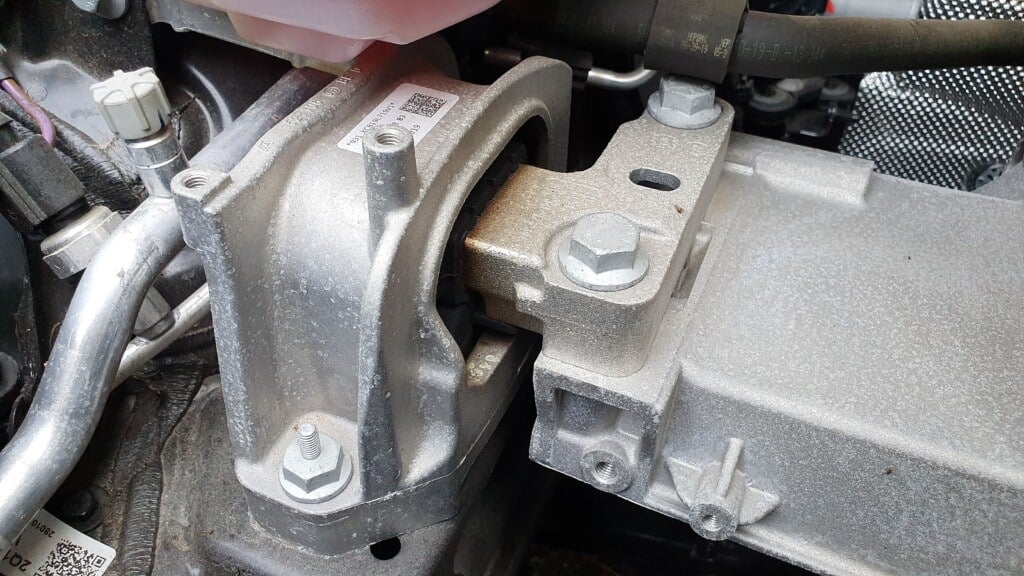
The motor mounts help to keep the engine secure under the hood. The more you drive, the more torque these mounts have to deal with. Over time, they will break.
Rattling will occur, especially as you accelerate and push the vehicle to move forward. Plus, there are transmission mounts that can cause the same noise.
7. Faulty Belt Tensioner Or Idler Pulley
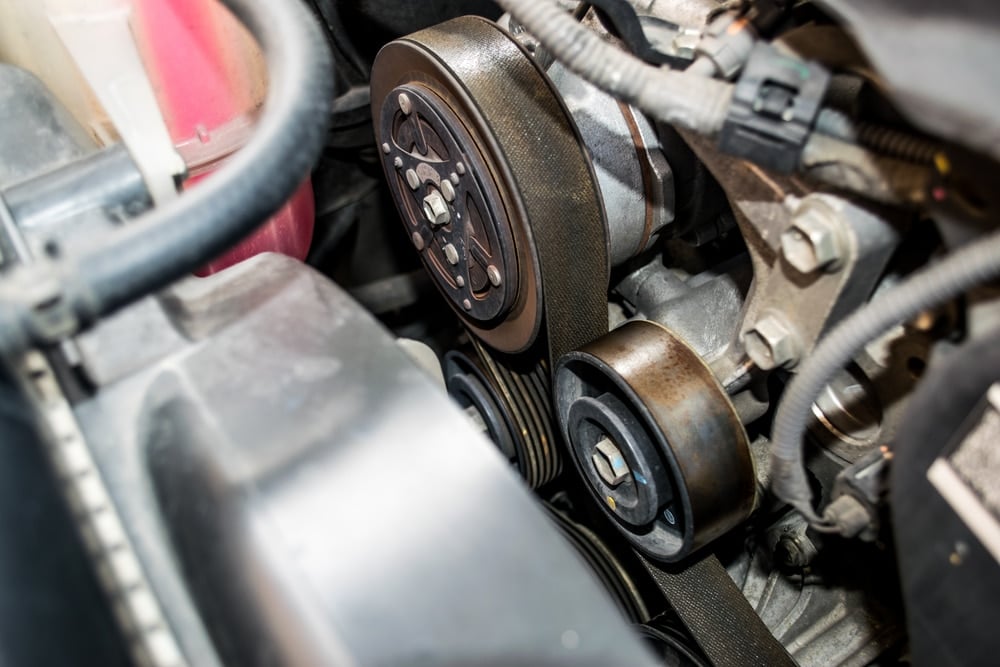
The tensioner and idler pulley are responsible for guiding the serpentine belt. If the belt gets off-track, it can cause trouble with everything it runs, such as the radiator fan, water pump, alternator and other components.
The spring-loaded tensioner holds the belt tight, giving just enough play. In comparison, the idler pulley is responsible for helping to route the belt, working hand-in-hand with the tensioner. If either part fails, the belt can no longer travel along its path smoothly. What you end up with is a rattle, often most noticeable during acceleration.
RELATED: 5 Symptoms Of A Bad Tensioner Pulley and Replacement Cost
8. Other Damaged Engine Parts
Engine rattles can be caused by other parts that have failed. If you hear an internal rattle, you may be dealing with a collapsed lifter or a bad bearing.
There’s also the chance that a rod knock or piston slap is occurring, both of which are serious. When it comes to engine noise, you don’t want to put off any repair.
9. Worn Suspension Parts
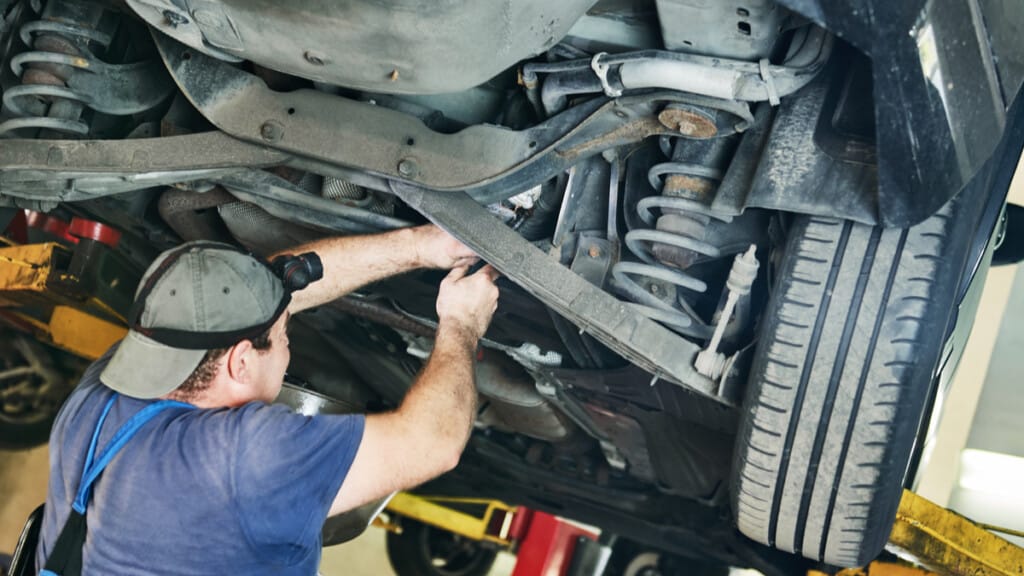
A lot is riding on your car’s suspension. Any part that fails can lead to a rattling sound, most prominent when you accelerate or go over a bump.
The failing parts may include the shocks or struts. You may also have trouble with the ball joints or inner tie rods.
10. Bad CV Joints
Speaking of bad suspension parts, there’s also the chance the CV joints are bad. The constant velocity (CV) joints are needed to distribute power to the wheels.
Because of debris and many miles of use, the CV joints can fail. When they do, you will notice a rougher ride that also increases the noise.
How To Fix A Car That Rattles When Accelerating
You don’t have to be a professional mechanic to figure out what’s wrong with your car. You already know something is wrong based on the rattle. Now you just have to determine what’s causing it. Here are some steps to consider.
1. Open The Hood And Listen For Noises
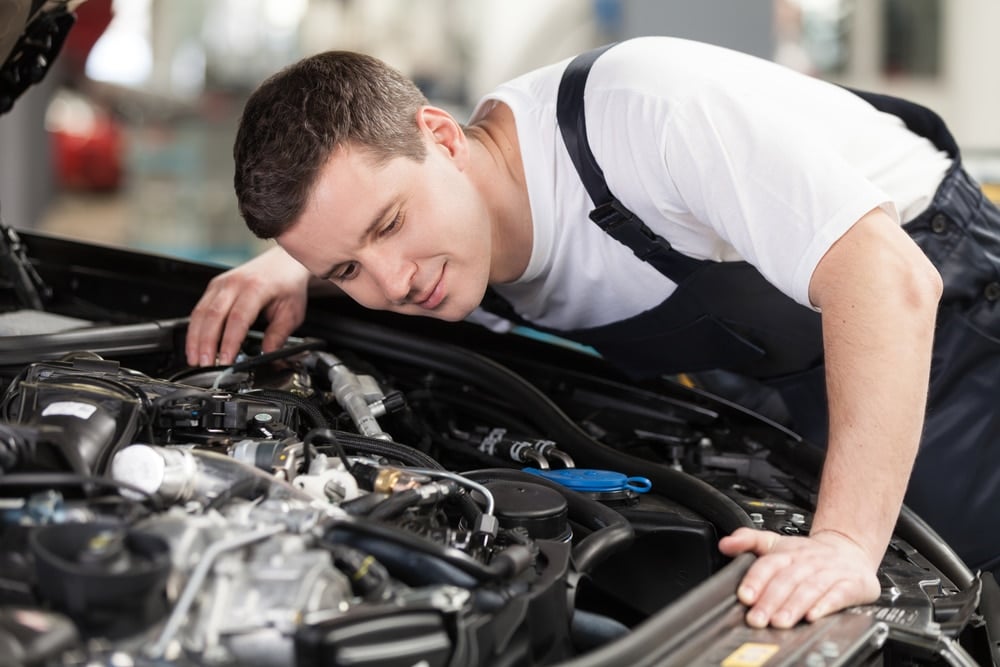
You can use a tool that’s free to diagnose problems. Open your ears and get busy listening for the problem. Pop open the hood and get close until you pinpoint where it’s coming from.
It’s very important that you avoid getting too close to the moving parts. Your hair, loose clothing and other body parts could get caught in the moving components.
2. Listen Under The Vehicle
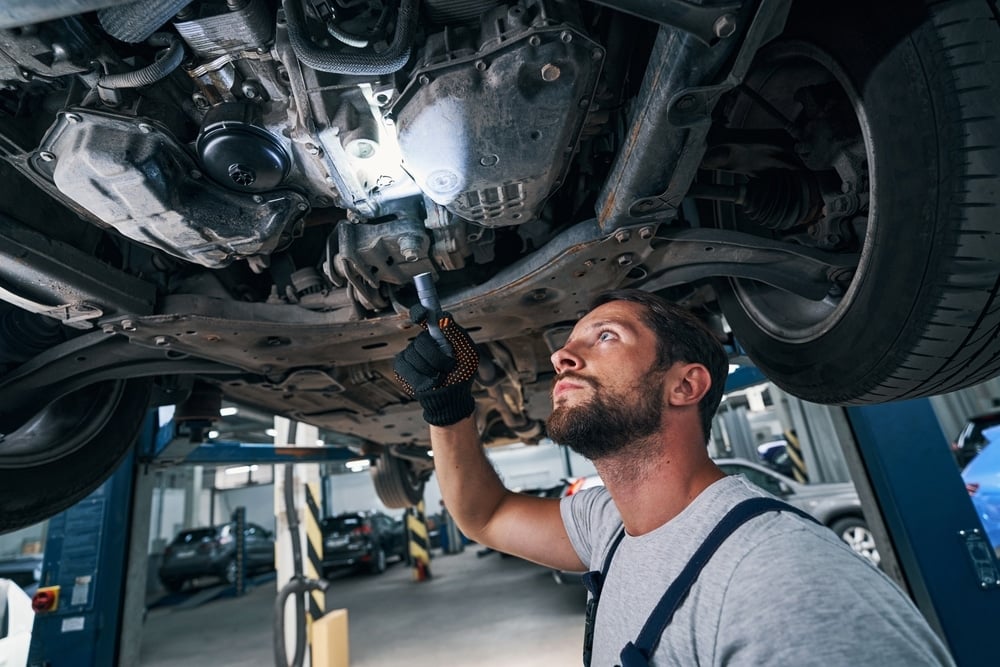
If you can’t find the rattling noise under the hood, it’s time to look under the vehicle. While the engine is running, see if you can discern where the noise is coming from. It may be difficult if the rattle only happens while accelerating.
If you need to get further under the car, you may need to jack it up. However, you should always do this with caution and make sure it is secure on jack stands before sticking your head underneath.
3. Check Exhaust
The rattle could be coming from the exhaust, which isn’t always easy to diagnose. You will have even more trouble if the noise is only happening while you accelerate, but you can check the catalytic converter.
Grab a rubber hammer and work through these steps.
- Raise up the vehicle slightly in the front to get to the converter.
- Put the vehicle on jack stands in the appropriate space to ensure your safety.
- Chock the rear wheels.
- Apply the parking brake.
- Use your rubber hammer to tap on the catalytic converter.
If there’s a rattling noise inside the cat, you should replace it.
4. Check Engine Oil And Pressure
Most cars have a warning light when the engine oil pressure gets low. If this comes on, you would want to stop driving until you fix it.
You should also check the engine oil level. If the oil is dirty, it’s better to change it and put a new filter on. Otherwise, you can simply add a little more oil to top off the system. If the oil continues to drop low, you may be dealing with a leak that needs to be repaired. If the leak isn’t visible, it could be internal, such as what happens with a blown head gasket.
5. Check Serpentine Belt And Tensioners
To diagnose the serpentine belt, tensioners and idler pulleys, you need to perform a visual inspection. Consider these helpful tips.
- Listen to the belt while it’s running. When the serpentine belt gets worn, it squeals.
- Check the surface and ends of the belt for cracking or fraying.
- Inspect the belt if it is glazed.
- Check the tension to make sure there isn’t any play.
If the belt looks worn or old, you may want to replace it. The diagram you need should be in the service manual or under the car hood.
6. Check Suspension
A visual inspection of the suspension is helpful too. You may have narrowed down what’s wrong based on your listening experiment.
Once you know where to look, you can see if the struts, shocks or other suspension parts are worn. Change them as needed.
7. Contact A Professional
If you’ve hit a dead end trying to figure out what’s wrong or with the repair, it’s best to take your car to a mechanic. You shouldn’t attempt to fix anything you aren’t familiar with, or you could create more damage.
Check online reviews for mechanics in your area. Ask your friends and family who they recommend as well.
How do I fix a rattling noise when I accelerate?
First, you need to find out what’s causing the rattling noise by listening and running some diagnostics. Once you know where the rattle is coming from, you can repair it. You may be looking at an exhaust, engine or suspension repair, depending on what’s broken.
What does transmission rattling sound like?
Failing transmissions make a variety of sounds. It can create a growling or light knocking. You may also hear some gear rattle that comes from between the gear teeth. Have a qualified mechanic look at the transmission before problems get worse.
Can low transmission fluid cause rattling noise?
Yes, fluid is needed to lubricate the inner components of the transmission. If the fluid drops too low, the metal components in the transmission can start to rub, creating a grinding or rattling noise. If damage hasn’t been done, you should be able to top off the system to stop the rattling.
Why does it sound like something is rattling under my car?
A piece of the exhaust might have gotten loose, creating a rattle. It’s also possible that a suspension component is causing the rattling, such as a shock or strut. Only a thorough inspection of the systems will reveal what needs to be fixed.
Does a bad catalytic converter rattle?
Yes, as the catalyst breaks free inside the converter, it can create a rattling sound. Once the catalyst is free inside, the converter isn’t going to do its job. Your car will fail emissions testing and it could make strange noises until you replace the converter.
Cars are known for making a variety of strange sounds, some that are normal and others that can be alarming. Even as professionals, we still hear some new sounds at times that catch our attention. If your car rattles when accelerating, you know it’s time to take action.
Figure out what’s causing the rattling before it gets worse. Your passengers will thank you for creating a quieter ride.
Categories: Troubleshooting
